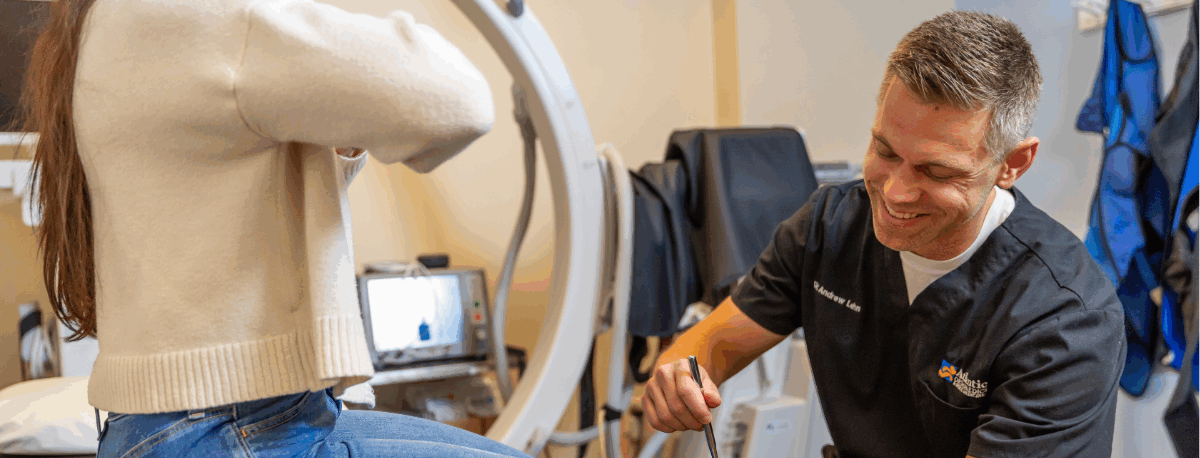Summer’s here—time for barbecues, beach days, and family road trips. But if you’re one of the millions struggling with chronic back, neck, or joint pain, even those simple pleasures can feel out of reach. The good news is that a minimally invasive procedure called Radiofrequency Ablation may be able to help. At Atlantic Orthopaedics, pain management specialist Dr. Andrew Lehn has seen firsthand how this treatment can dramatically improve quality of life for patients suffering from chronic pain.
What Is Radiofrequency Ablation?
Radiofrequency Ablation (RFA) is a targeted treatment designed help lower back pain. The procedure targets the small nerves that transmit pain signals from the joints in your spine to your brain. RFA uses heat generated by radio waves to disable a small section of nerve tissue. By “turning off” these nerves, the procedure can provide long-lasting pain relief, especially in the lower back, neck, and arthritic joints.
How Do I Know if the Procedure Is Right for Me?
Radiofrequency Ablation isn’t for everyone, but it’s an excellent option if you:
- Have chronic low back pain (often diagnosed as facet joint arthritis).
- Have not experienced significant relief from medication, injections, or physical therapy and want to avoid—or delay—major surgery.
- Are in generally good health and can undergo a minimally invasive outpatient procedure.
To determine if RFA could benefit you, the first step is to schedule a consultation with Dr. Lehn. He will review your medical history, perform a physical exam, and order imaging to evaluate the degree of damage from your arthritis or spinal injury. He will then use a diagnostic block test to pinpoint the source of your pain. In the test, a local anesthetic is injected near the source, and if the injection alleviates your pain, it means you may be a good candidate for RFA.
What Is Involved in the RFA Procedure?
- You’ll be positioned face down on a specialized X-ray table, and you’ll stay awake so you can respond to any questions. Medication to help you relax during the procedure is optional.
- Your provider will numb the skin at the treatment area with a local anesthetic, then insert a fine needle using live X-ray guidance for precise targeting. You may feel brief pressure, but most patients describe it as far less uncomfortable than their everyday arthritis pain.
- Then, an electrode is inserted through the needle to determine that the placement is correct. You may feel a slight tingling, muscle twitch, or mild discomfort—an indication that the electrode is in the right position.
- With the location confirmed, radiofrequency energy is transmitted through the needle using the same electrode to heat and disable the targeted nerve, preventing it from transmitting pain signals to your brain. The procedure can take anywhere from 15 minutes to half a hour, depending on the number of nerves being treated. RFA is an outpatient procedure, so you will be able to go home the same day. Recovery time usually takes a few days at most.
- With the nerve “turned off,” you should notice a decrease in pain. Some patients experience immediate relief, but for others it may take more time. Side effects can include mild inflammation or tenderness at the injection site that should resolve within a week.
- You’ll come in for a follow-up appointment about two weeks after the procedure to assess your condition.
RFA is considered very safe and involves very few complications compared to more invasive surgeries. Though some patients experience relief that lasts several years, treated nerves can regrow, and the procedure can be repeated if your pain returns after a period of six months or longer.
Benefits of RFA
- Sustained Pain Relief: Many patients enjoy six to 12 months (or more) of significantly reduced pain.
- Minimal Downtime: Most people return to normal activities within a day or two.
- Reduced Medication Dependence: Less reliance on oral pain meds or steroids means fewer side effects.
- Improved Mobility: With the pain dialed down, you can move more freely.
Here’s what a recent patient had to say about RFA:
“I’ve been seeing Dr. Lehn for almost a year now and have had positive results. I have low back arthritis and started off having cortisone shots which only helped for the short term. Dr. Lehn suggested an ablation for my back. I feel great one day later and I’m walking better. This is a great alternative to surgery. Dr. Lehn has always been positive, answering all my questions and concerns.”
Summer doesn’t have to be a season you watch from the sidelines. With Radiofrequency Ablation, you can return to the activities you love—whether that means pickleball, playing with the grandkids, or just enjoying a comfortable car ride to the beach. If chronic pain has been putting your life on hold, Dr. Andrew Lehn and the team at Atlantic Orthopaedics & Sports Medicine are here to help you take it back.
Ready to make pain a memory? Contact us to request an appointment today.



